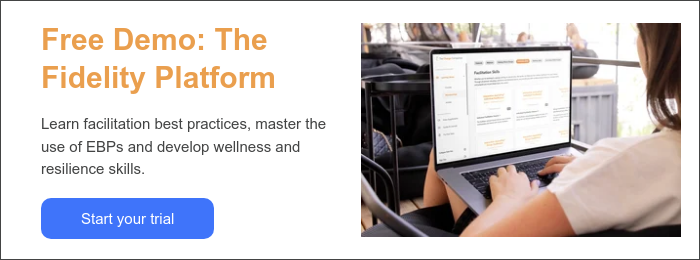Using Tuckman’s Group Stages Theory in Open Group Cognitive-behavioral Programming

Open group programming – an approach that consists of individuals coming and going at different stages – provides the opportunity for ongoing program delivery regardless of when participants are coming and going. Open group facilitation includes certain challenges as well, such as building cohesion and safety and establishing a healthy group dynamic in each session.
Bruce Tuckman’s five stages of group development provide a unique framework for addressing many of these challenges. Originally developed as a model for closed groups, the group stages describe how a group interacts in different ways at different times throughout the group process. Open group facilitators can benefit from understanding this model in order to nudge participants into stages that represent optimal sharing and engagement in each session.
Group stage 1: Forming
During the forming stage, participants are polite and learning about their role within the group. They are often working to better understand the work they will be doing and how they will fit.
Open group tips for forming include:
| Spend one-to-one time with a participant before they start their first session to go over what they can expect from their time in the group | |
| Allow extra time for participants to mingle before and after each session | |
| Invite participants to come early and help you set up the room | |
| Enjoy refreshments to casually get acquainted |
Group stage 2: Storming
During the storming stage, participants are learning about each other’s working styles and may push back against each other and/or the facilitator.
Open group tips for storming include:
| Have a senior participant summarize group agreements and expectations at the beginning of each session | |
| Allow incoming participants to introduce themselves and share what they are hoping to get out of the group | |
| Gain skills for increasing motivation and “rolling with resistance” when challenges or concerns arise | |
| Gain skills for effectively working with different types of personalities |
Group stage 3: Norming
During the norming stage, participants begin to resolve differences and become more comfortable giving and receiving constructive feedback.
Open group tips for norming include:
| Begin each session with a rounds activity, warm-up question or small-group discussion to help everyone become comfortable with sharing | |
| Allow senior group members to help your group refocus when conversations get off-track |
Group stage 4: Performing
During the performing stage, the group is committed to performing well and achieving group goals.
Open group tips for performing:
| Have participants share reflections on what was learned at the end of each session | |
| Summarize the experience and affirm participants at the end of each session |
Group stage 5: Adjourning
The adjourning stage means “goodbye.” Participants complete program goals and disengage from relationships. During a planned goodbye session, participants may receive recognition and say personal farewells.
Open group tips for adjourning:
| Allow outgoing participants to share their experience, progress and next steps | |
| Offer certificates or other forms of recognition for outgoing participants | |
| Share next steps with returning participants | |
| Occasionally invite group alumni to return and share their experience with current group members |
Building these strategies into your open-group programs can help your participants feel a sense of trust and safety starting on day 1.
The Change Companies offers a range of evidence-based group facilitation strategies in our cognitive-behavioral curricula. Learn more about our core EBP, Interactive Journaling®.



